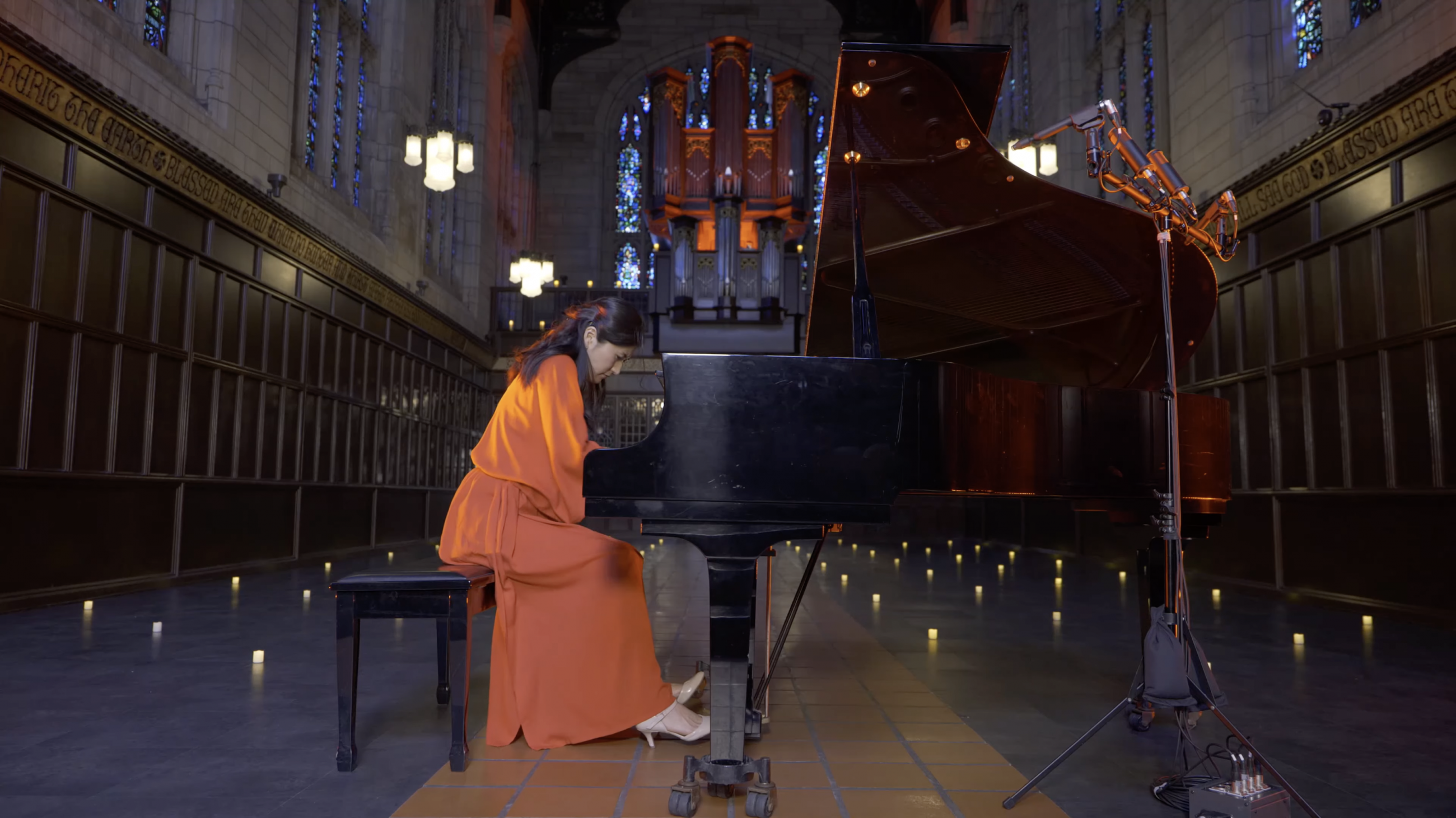
Streaming from November 11 through November 18, luminous pianist Eugenia Jeong presents a masterfully curated virtual concert of solo works by Korean, Israeli, and Syrian composers in the still beauty of Bond Chapel and the impressive Gothic form of the International House. Exploring music from North and South Korea and the Middle East, this program highlights composers from two greatly conflicted locations in the modern world. Jeong’s deeply personal program urges the listener to consider the varied perspectives of the featured composers. Jeong's artist statement below details the meaning and intent behind this program, titled From Both Sides. This concert is part of the SOUND/SITES Series and is a co-production by UChicago Presents and the Department of Music. Learn more, watch the trailer, and purchase tickets here.
Artist Statement
South Korea is a place I once called home. I see my family sitting around the dining table digging into a hot bowl of stew. I can picture the neighborhood where I grew up and the different stationery stores (moon bang goo) that I would stop by on my way home from school. I see dozens of slipper cases tucked into the outer walls of each classroom. I hear sounds of cheering and yelling during recess. In all my years living there, North Korea was a distant place that appeared in textbooks. But that changed many years later, when my younger brother signed us up as volunteers at an immersive English summer camp for North Korean refugees. Remembering that time, I hear voices crackling with laughter as students sheepishly abide by the “English only” rule. I see eager and tender eyes blinking behind notebooks and food trays. I see the fragile look of a girl who refused to eat because it made her think of the food that her parents couldn’t have at a concentration camp. I feel the sadness in my dad’s voice in the rare times he would mention my late grandma’s older brother in North Korea, whom he never knew.
The word Israel brings me back to the beautiful simplicity of kibbutz life in the middle of the Negev desert where I spent two magical summers stargazing at night and sitting through hours and hours of mind-blowing piano master classes by day. I see the faces of friends and teachers whom I adore. I feel the white sand under my feet walking along the Mediterranean Sea, the orange sunset pouring over the rocks. I see the austere look of stone walls and ancient city streets of Old Jerusalem, the contested city sacred to three faiths. I remember the way Yad Vashem crushed me to tears. One afternoon, while ordering a falafel wrap in Tel Aviv, my jaw dropped watching a news report about a bomb that landed on a bus near Beer Sheba, close to where we came from. Later that evening, I learned that two individuals I knew were on that bus. The intense complexity of these experiences lived with me. Four years later, I decided to go back. This time I was determined to see the “other side.” I remember the half-hour bus ride from Jerusalem to Bethlehem that felt so much longer, the surreal moment of driving past the infamous red warning sign that forbids the entrance of Israel citizens. My first memory of the West Bank is the smell of freshly baked pastry and falafel in the crowded streets of Palestine, where the entire place feels like a family. I hear the festive sound of music at an Arabic wedding ceremony my friend and I were invited to. The unrestrained kindness and generosity shown by my hosts moved me deeply, as much as the stories of sacrifices they made in order to survive. I see the eyes of the children standing in the narrow streets of the refugee camp looking back at me. I see the faces of dear friends who opened my eyes to a different reality than what I knew from the media.
If it is indeed possible to dream the seemingly impossible through the arts, this is mine— a world in which the irreconcilable issues dividing these people would kindle peaceful dialogue, mutual understanding, more listening, and an acknowledgement of stories from both sides in ways that will cultivate trust. Each piece on this program was chosen with the geographical places in mind. All of the composers now live or have lived away from their “motherland” or country of origin, except for Ryun Hee Lee from North Korea, who I presume did not leave. These composers speak in a musical language as diverse and wildly contrasting as their unique stories, perhaps even in ways one might find surprising. Where does Robert Schumann belong here, you might ask? I use The Arabesque, Op. 18 and its fragments to act as a personification of you and me, listening, conversing, merging with both sides of the story.
This project would not have been possible without Amy Iwano and Berthold Hoeckner who envisioned the Sound/Sites series. A warm thanks to Barbara Schubert for your relentless support from day 1. A special thanks to Dongryul Lee for composing “Lessons on Light and Darkness” for this project and your deep thoughtfulness, Shulamit Ran for your warm responses and making the time to hear me play, Jean Ahn, for your enthusiasm and sharing resources so freely, Ryun Hee Kim for your beautiful tune – I wish I could tell you. A heartfelt thank you to Jessica Wolfe for working tirelessly behind the scenes (and on set) to help everything run smoothly. Thank you, Dan Nichols and Mark Alletag from Aphorism Productions for your exquisite ears and artistic touch. Maria Savannah, Danielle Garcia, Laura Norton, Ken Orgel, staff workers of Bond Chapel and I-House for being such a wonderfully supportive team. A thank you and shoutout to my students who inspire me everyday. Last but not least, I am forever grateful for my dear family and friends for your constant and loving support.
Eugenia Jeong
